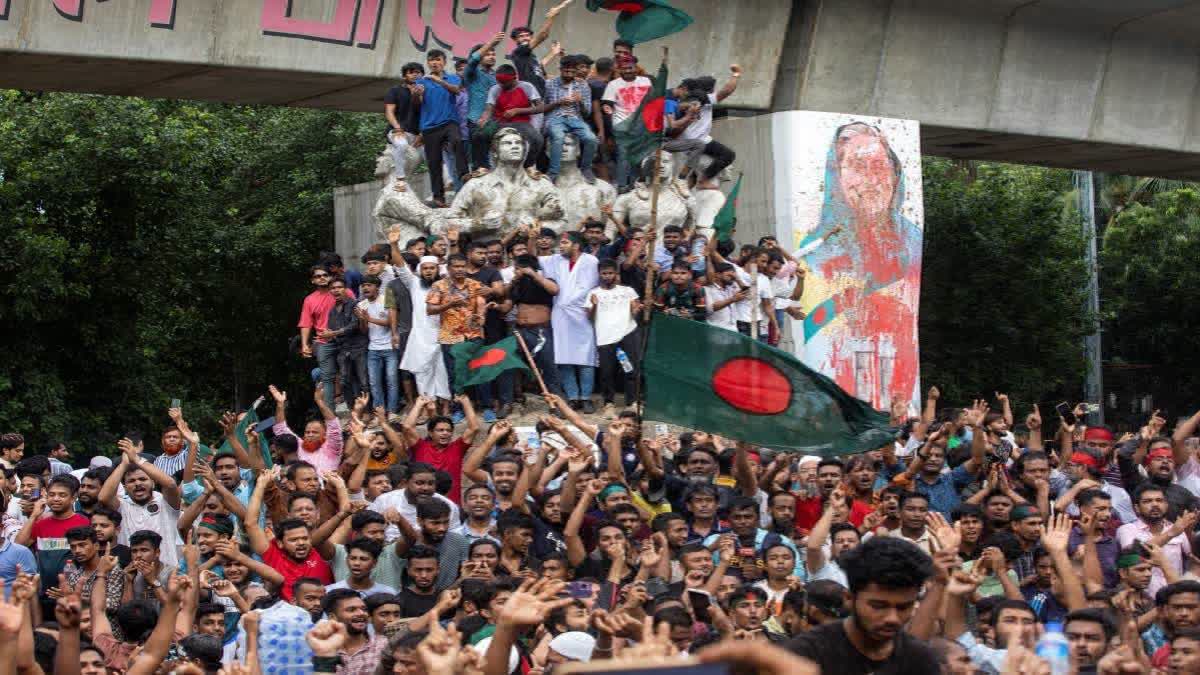Thiruvananthapuram: The developments in Bangladesh over the past one week have shocked many. Sheikh Hasina, who served as Prime Minister for 15 years, was suddenly depicted as a dictator and fascist, and exiled. However, the exact circumstances of these events still remain unclear. Dr TP Srinivasan, a former Indian Ambassador to the United States and a leading diplomatic expert has assessed the situation in Bangladesh.
According to Dr Srinivasan, until a week ago, there were no significant issues. "Some controversies surrounded Sheikh Hasina's administration, particularly concerning the use of stringent laws, but her leadership had contributed to rapid development, at one point even surpassing India in some aspects. Although her governance was effective, she faced opposition from various quarters," he said.
Hasina had kept her rival and former Prime Minister, Begum Khaleda Zia, in jail for years. Recently, student protests erupted over reservation policies related to the Bangladesh Liberation Movement. However, after judicial intervention resolved the issue, the situation deteriorated rapidly. The reasons behind this sudden shift, however, remain uncertain, Dr Srinivasan said.
Is the Sino-Pakistani Axis Involved?
The former Indian Ambassador US said that there is a speculation that China might be involved in these developments. Sheikh Hasina had visited China shortly before these events, but her reception had been unusually cold and unceremonious. This odd treatment has fueled suspicions of China's involvement, he said. "Also, China is known to consult Pakistan before formulating its policies on Southeast Asian countries, adding to doubts about its role in the current situation in Bangladesh. The student protests quickly turned violent, escalating to the point of fatalities," he added.
"It is believed that Sheikh Hasina resigned and left the country, possibly at the behest of the Bangladesh Army. She and her associates reportedly reached India by helicopter and are now in Delhi. It remains unclear how long they will stay in India. An interim government has been formed under the leadership of Muhammad Yunus, a Nobel laureate. Yunus was awarded the Nobel Peace Prize in 2006 for his efforts in empowering women through the Grameen Bank. Due to previous disagreements, Hasina had excluded Yunus from political affairs, though there was sentiment that he should enter politics. Yunus has now assembled a cabinet to address this demand," Dr Srinivasan said.
The diplomatic expert said that in the light of allegations that Hasina's recent election was neither free nor fair, Yunus's primary focus will be on ensuring a transparent electoral process. Reports indicated that the United States was displeased with the election results. "This represents a significant shift in Bangladesh’s history. The assassination of Mujibur Rahman, the leader of the Bangladesh Liberation Movement, in 1975 is now being revisited, with agitators vandalising his statues and monuments, allegedly influenced by external factors like Pakistan," he said.
Economic Implications for Bangladesh:
Dr Srinivas said that Bangladesh, already a poor country, may face further economic setbacks due to the current instability. The escalating violence suggests that the problems will not be resolved soon. If by-elections are imminent, it is evident that the agitators are not interested in holding elections promptly. India has lost a significant ally in Sheikh Hasina, who, along with Begum Khaleda Zia, alternated in power. Khaleda Zia was not keen on maintaining strong ties with India, whereas Sheikh Hasina fostered a robust relationship over the past 15 years, leading to substantial Indian investment in Bangladesh.
"The current instability is detrimental to investors. If the new government decides to nationalise investments, it could have severe consequences for those who have invested in Bangladesh. It is hoped that Yunus, as interim Prime Minister, will act with moderation. However, the future of India-Bangladesh relations remain uncertain until the forces behind Yunus’s leadership are clarified," he said.
Although Sheikh Hasina has indicated a willingness to return if democracy is restored, there is no certainty about her return or the restoration of democratic processes in Bangladesh. For now, it is certain that Sheikh Hasina's life has been spared. The country is undoubtedly navigating through a very challenging period, the diplomatic expert added.
Read more




